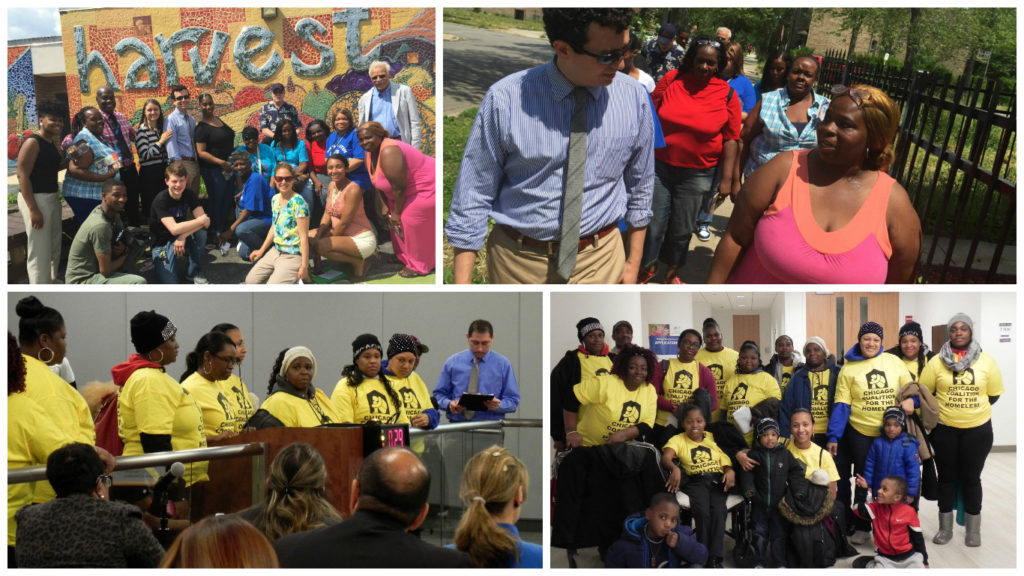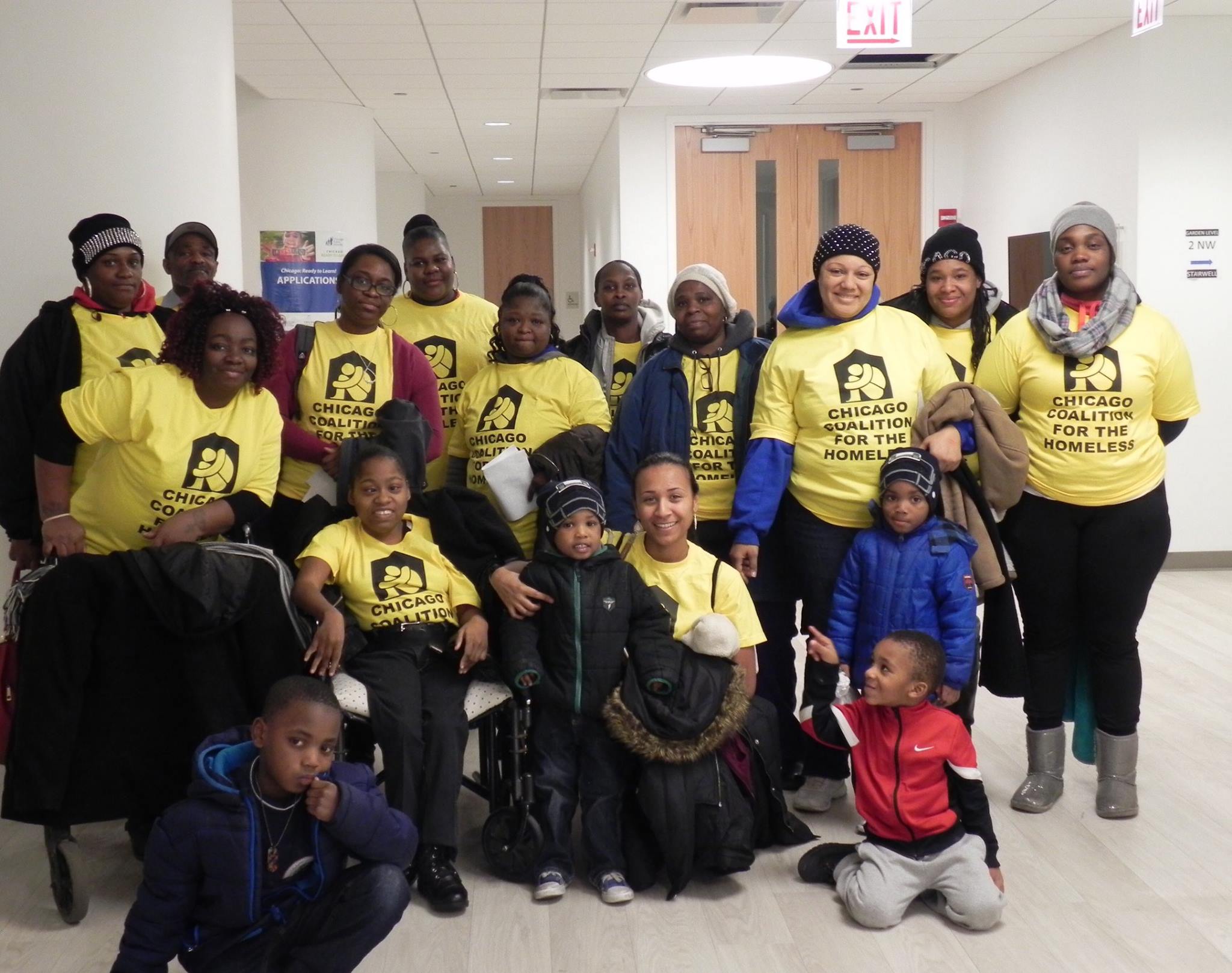
By Hannah Willage, Associate Director of Organizing
Kudos to the Education Committee at the Chicago Coalition for the Homeless — the leaders’ group advocated for 18 months for a strong, updated policy on homeless education within the Chicago Public Schools.
We are pleased to report that the Chicago Board of Education adopted the new policy on April 20, replacing CPS’s outdated 20-year-old policy. CPS publicly credited CCH for its work, its chief education officer commending our “tireless work… (to) help develop a policy that is thoughtful, comprehensive and effective.”
Under the new policy, homeless CPS students are guaranteed:
a) Immediate enrollment in school, even if a student is unable to produce proof of residence, proof of guardianship, previous school records, or health/immunization records.
b) Immediate and full participation in school activities, including sports.
c) To be provided school supplies, school uniforms, waiver of school fees, free school meals, and tutoring services.
The 1996 policy clearly needed to be updated, but CPS initially drafted a policy only two paragraphs long – it also proposed that CPS could amend the policy by simply publishing revisions on its website. We vigorously objected to this oversimplified draft.
Advocating for CCH were homeless and recently homeless parents and students who work with advocates on its Education Committee. The group collaborated with attorneys from the Law Project. Homeless students and youth comprise 93% of CCH legal aid clients.
Committee members were outraged by the draft policy because it could be easily changed or weakened, without public input. This possibility was especially troubling in light of frequent leadership changes at CPS. In addition, having student rights outlined in an official board policy signals to schools and staff that the rights of homeless students are serious and important.
After dozens of conversations with homeless parents and students directly impacted by the policy, the Education Committee decided to seek policy improvements in five areas: immediate enrollment, transportation, responsibilities of each school’s homeless liaison, school fee waivers, and uniforms and school supplies.
Members of the Education Committee met with CPS staff responsible for drafting the policy, testified before the Chicago Board of Education at eight different Board meetings, and met on several occasions with the mayor’s chief of policy, Michael Negron.
Numerous policy drafts were circulated based on the feedback of the Education Committee. One of those drafts contained a provision that would have created a barrier to getting to school, by proposing to deny transportation to homeless students who live less than 1.5 miles from their school. This provision would have violated state and federal laws that provide for transportation without distance restrictions.
To demonstrate the barriers, the Education Committee invited Mr. Negron to walk with them near a West Side elementary school, Melody, that enrolls nearly 100 students experiencing homelessness. He joined them in a 1.5-mile summer walk, talking with our group about the challenges students and families face. Parents and former students also testified on the potential hardship to the Board of Education. After their advocacy, the 1.5-mile limit was removed from draft policies.
CCH congratulates the members of the Education Committee for sharing personal stories, devoting their time and energy, and becoming expert on state and federal laws protecting homeless students. There were many tears in this fight as the struggles that homeless students face are personal to the members of the Education Committee.
But they did not let their pain hold them back: They fought hard and turned pain into power.
The new CPS policy is a step in the right direction – expanded to seven pages, it is more detailed and comprehensive. Although it does not address all the rights of homeless students, the policy clearly states that it does not “limit rights or obligations created by” state and federal homeless education laws.
Chicago Coalition for the Homeless will continue to hold Chicago Public Schools accountable for implementing the rights in the new policy, as well as the rights of homeless students under state and federal law.
Any homeless student with issues related to school enrollment or services can call the Law Project for assistance, at (800) 940-1119. Homelessness includes those living doubled-up in the homes of others out of economic hardship.
Congratulations to these CCH leaders who made a great contribution to ensuring homeless students have access to their public schools:
Marilyn Escoe, Taishi Neuman, Ashley Allen, Charles Jenkins, Kaleyah Wesley, Kiahni Chew, Brandon Dunlap, Kendra Smith, Jayme Robinson, Sam Neuman, Candice Bryant, Vanessa Spencer, Lucille Landry, Jackie Browder, Janet Dew, Pam Magee, Carmen Arnold, Carol Miller, Heidi Wagman, Ellen Schor, Tyrita Osborne, Latoya Ellis, Leola Smith, Lesa Simmons, Sharonda Pierce, Debra Dickerson, Leeanna Majors, Nora Wilburne, Juliana Reed, Shawnece Joseph, Dorothy Terry, Janetta Clark, Queen Wiliford, Tia Carter, Malika Harris, Davonte Henry, Andrew Strmic, Michael Finney, Jennifer Kim, Melanie Hall, Marlena Hall, Damika Bennett, Dexter Leggins, Joey Reed, Nicholas Jordan, Lakendra Lockhart, Jezekiah Jackson, Shareef Peoples, Shruti Sharma, Jim Lacy, Kenya Barbara, and Gabrielle Dapremont.

